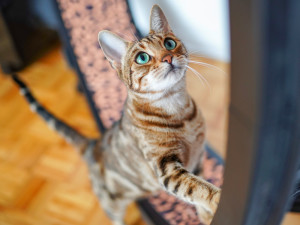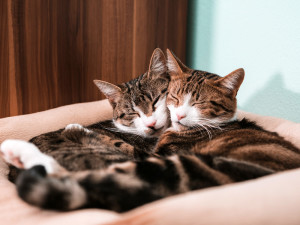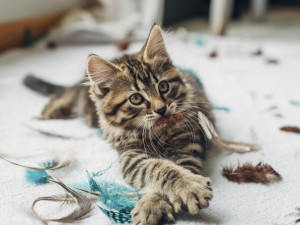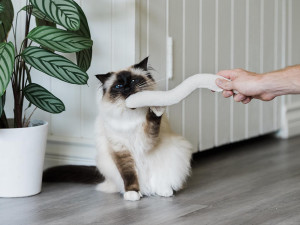Having This In Your Home Will Make Your Cat Scratch More, New Study Says
Plus, how to keep your kitty from destroying the couch.
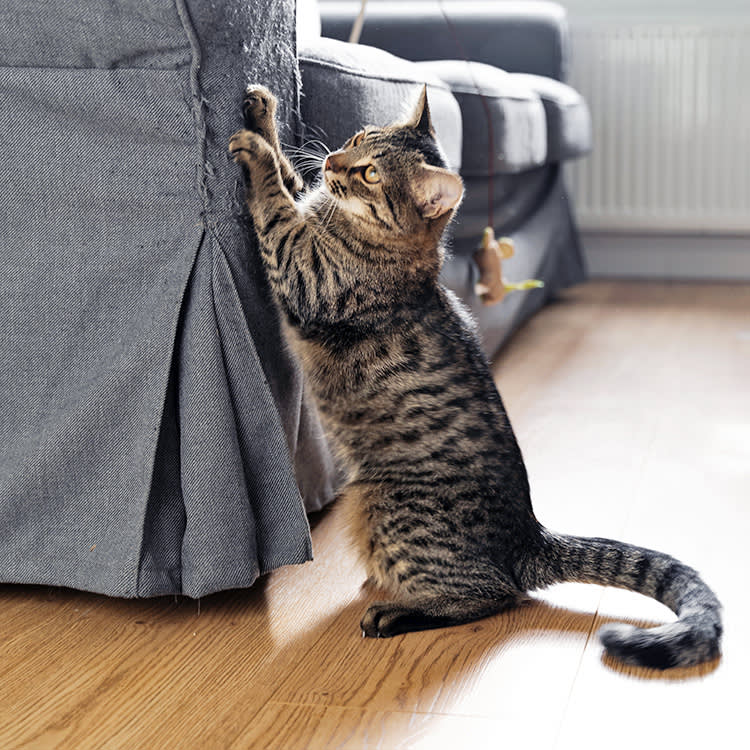
Share Article
Cats scratch. It’s what they do. In fact, it’s good for themopens in new tab — it keeps their claws trim and healthy, gives them a good stretch, and releases pheromones. But if you have a cat who scratches…and scratches…and scratches…then you know those claws can sometimes be destructive. As many trees and pads as you stock up on, some kitties just can’t get enough of your couch. In a new studyopens in new tab published in Frontiers in Veterinary Science, scientists got to the bottom of why some cats are more prone to scratching — and how you can get them to stop.
Why some cats scratch more than others.
Researchers conducted a questionnaire and received data on 1,211 cats. The questionnaire had three sections: one on caregiver demographics; one on the cats’ routines, environments, and temperaments; and one on the cats’ scratching habits. They were then able to categorize cats as “low scratching” or “high scratching” and analyze what set these groups apart.
They found no significant differences based on gender, weight, neutering status, or between purebred and mixed-breed cats. Instead, they found environmental components that led to increased scratching.
For one, the presence of a child in the home correlated with higher levels of scratching. “It appears that the presence of a child in the household could potentially contribute to heightened stress levels, thereby leading to more frequent and intense scratching episodes,” wrote the study’s lead author, Yasemin Salgirli Demirbas.

Play time can be a factor, too. While play is necessary for cats, prolonged play seems to lead to unwanted scratching behavior. Researchers proposed that this may be because of heightened stress from inappropriate routines. “In the wild, individual play is intertwined with predation, necessitating a heightened arousal level for repetitive yet brief periods,” Salgirli Demi̇rbas wrote. Long play sessions may over-excite cats, leading to nocturnal and destructive behavior.
How to stop your cat from scratching.
Don’t let this new information deter you from playing with your cat — because on the flip side, bored cats may act up more, too. Play is important for your cat’s mental and physical health, and it helps cats and their pet parents bond. To reduce scratching, the scientists recommend using “regular and brief interactive play sessions, coupled with offering suitable toys.” This play method better aligns with your cat’s natural instincts, which may calm them down.
Cat behaviorist Dr. Mikel Delgado recommends toys that allow you to interact with your cat, such as wands, over solo toys. “The solo-play toys are important and fun, especially for kittens, but that’s not the key type of play that cats really benefit from, which is really mimicking the hunting experience through interactive play,” Dr. Delgado told us.
The study found that the location of scratching posts played a role in influencing scratching behavior. “Providing well-positioned scratching posts in areas frequented by the cat may help redirect scratching to more appropriate surfaces, reducing damage to household items,” Salgirli Demi̇rbas wrote.
The researchers also cite previous studiesopens in new tab which show that using feline synthetic pheromones can help reduce unwanted scratching. These pheromones can help reduce stress and anxiety in cats.
“Understanding the underlying emotional motivations of scratching behavior, such as frustration, which seem to be linked to personality traits and environmental factors, allows caregivers to address these issues directly,” Salgirli Demirbas said in a statement.opens in new tab “Our findings can help caregivers manage and redirect scratching to appropriate materials, which could help foster a more harmonious living environment for both cats and their caregivers.”

Sio Hornbuckle
Sio Hornbuckle is the Assistant Editor at Kinship, where they frequently write for the site. As a writer, they specialize in pet news, animal science, and pop culture. They live in New York City with their cat, Toni Collette.
Related articles
![Two tabby cats in embrace lying in cushion.]()
What Are Cat Pheromones and How Do They Work?
Communication is key, and pheromones are your cat’s version of DMs.
![A kitten playing with feathers]()
Not All Cat Toys Are Created Equal
Here are the toys that will motivate your pet to get in the game.
![A fluffy Siamese cat sitting on the wooden floor playing with a the Snake Cat Toy from Boba and Vespa next to a striped Calathea plant]()
7 Cat Kicker Toys That Will Help Your Cat Beat Their Boredom
The cat kicker toys that will keep your cat booked and busy (and kicking like they’re Megan Rapinoe).
![Cat looking at human]()
Does Your Scent Actually Help Calm Your Cat?
They want you around more than your sweaty T-shirt in their carrier, but thanks for the thought.
![Training a cat sitting with leash and harness on.]()
A Step by Step Guide on How to Clicker Train Your Cat
This popular training technique isn’t just for dogs. Here’s how you can use it for your cat.


